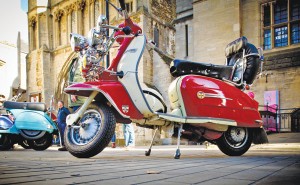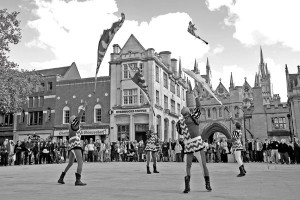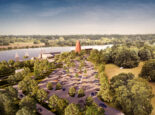Festa Italiana
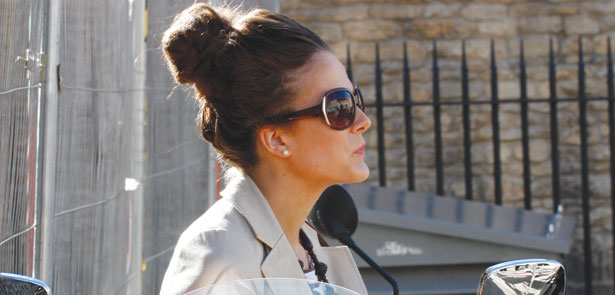
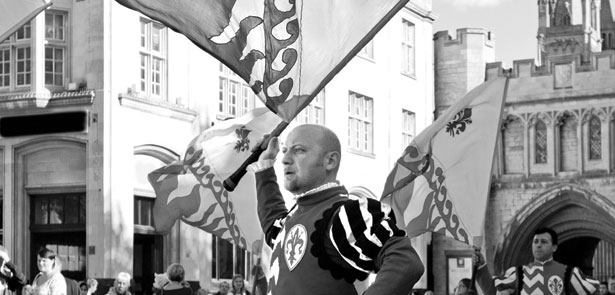
Peterborough’s Italian Festival has become a regular fixture in the social calendar. But what does all the fun and food mean for business in the city? The Business Moment reports...
Ask Marco Cereste – leader of Peterborough City Council, and Chairman of the Italian Community Association (ICA) – what the annual Italian festival means for Peterborough, and his answer is simple.
It’s about enjoying a bit of Italian food, a bit of Italian music, having a glass of Italian wine and all of us having a bit of fun together
Fun it certainly is – but the annual festival clearly has a significant impact on business, as more and more are starting to realise. For its fourth anniversary, the festival was extended over both Saturday and Sunday to accommodate the increasing number of businesses that wanted to take part.
It’s an opportunity for anyone who operates a business under the Italian community umbrella to showcase what we do to those who may not know us. How would anyone not want to embrace that? It’s a no-brainer!”
says Chris Falco, proprietor of Riva restaurant.
Unsurprisingly, food played a central role in the proceedings and Peterborough’s Italian restaurants came out in force with Mattoni, Riva, Ristorante Fratelli, Barista, Papa Luigi and The Pasta Shop, among others, all offering tastings of their wares.
Other attractions over the weekend included celebrity chef Gino D’Acampo live on stage, flag throwers from Florence, a genuine Italian market, cookery demonstrations by chefs from Forli (Peterborough’s twin town), Vespa and Lambretta displays, Italian holiday offers from Britaly
Travel and Ferrari memorabilia. Even non-Italian businesses joined in the festivities such as local Alfa Romeo dealership, Donalds, getting involved.
In addition to a record number of participants, the actual activities also reflected the increasingly ambitious nature of the festival. Last year, Riva provided vast quantities of meatballs, and helped to cook a special menu created by leading Italian guest chef Antonio Carluccio. This year, owner Chris Falco embraced the spirit of the festival with particular gusto and attempted something that had never been done in the city before – a 200-seater pop-up restaurant on Cathedral Square on the Saturday evening.
Chris described the challenge
You rock up to a site that has nothing on it, you put everything together from scratch, you do your thing, and afterwards it all disappears
In other words, everything needed to run a restaurant, including the cooking equipment, tables, chairs, cutlery, crockery, and glassware had to arrive on site on the day, and it not only had to work, but it had to create all the ambience you would expect of a restaurant – with the tables properly dressed and the marquee properly lit.
On the night, the restaurant served up a full five courses and entertainment in the shape of two opera singers and a string quartet during dinner, with a firework display to end the evening. It was fully booked, and proved a big hit. Chris believes this is not just a great success for him – it raises the bar and sets a challenge for restaurateurs around the region.
It is certainly setting a precedent for others to follow, and it demonstrates that this could be emulated elsewhere
Papa Luigi also ramped up their efforts this year by hosting “take and bake” pizza making for kids, a box making competition, and the World Pizza Eating Championships (that’s one you won’t find at the Olympics). Their efforts were rewarded with a reported 2.5% increase in profits the week following the festival, which indicates the very real potential for businesses in the city.
The beauty of the festival, from a business point of view, is that it is able to attract an extremely wide customer base – lovers of food, wine, music, cars and much more besides, catering to young and old. Manager of the ICA, Isabella Caruso, estimates that this year’s festival attracted up to 20,000 people over the two days – a new record. She said
It was absolutely tremendous; I’ve never seen the town so packed! I think every year so far the festival has grown by about 25%
Customers are not the only thing the festival has attracted; Antonio Carluccio, the guest chef at last year’s festival was so impressed that he decided to open a restaurant in the city which is due to open next month. In fact, the organisers have been overwhelmed by the unanimous positive feedback and are already planning to make things bigger and better next year.
The Italian Connection
Of Course, the festival is about more than just creating new business opportunities. It is first and foremost, a celebration of the 10,000-strong Italian community that has contributed to the city for over 50 years. And that contribution is evident pretty much everywhere you look. Marco Cereste’s father came over from Puglia in 1952 to find work, a refugee from the tough times and bad harvests that Italy was then experiencing. Like so many other Italian immigrants at the time, he found work making bricks – the bricks that literally built modern Peterborough. By the end of the 1950s, over 3,000 Italians were working for London Brick Company, mostly at their Fletton works. The need for Italian labour was so strong that the London Brick Company actually conducted several recruitment trips to southern Italy, where the majority of Peterborough’s Italian migrants came from.
The wave of Italian migrants slowed in the 1960’s, but the population has thrived with second and third generations who have embraced Peterborough as their home at the same time as upholding their heritage. The Italian community has since fanned out into all trades within the city from manufacturing roles in big firms such as Perkins, to self-made millionaires, and now make up the second largest ethnic group in Peterborough after the Asian community. What I’d really like to see is the other communities being inspired to do the same thing.
Marco himself is a perfect example of the Italian success story. From humble beginnings, like most of the Italian community, Marco has forged an incredibly successful business career – so much so that he has sat on the Council of Italians Abroad in Rome and received some of the highest honours the Italian government can bestow in recognition of his work, including the Grande Ufficiale.
Nowadays, the plethora of Italian cafe’s, restaurants and pizzerias is a very real indication of the strong Italian presence in Peterborough. The latter is so much part of the city’s culture that it has earned it the nickname “Pizzaborough”. But it would be very wrong to dismiss this simply as a joke; in 1982 Papa Luigi’s established the UK’s first pizza delivery service right here – a significant business innovation that has since been adopted nationwide. The fact that they are still flourishing and a leading light of the Festival says everything you need to know about them as a business – and, perhaps, says a great deal about the tenacity of those first Italian immigrants.
Let’s face it, if my parents had been well-off in Italy, they’d have stayed there. We’re here because it was a question of making a living and putting food on the table. And I think if you understand what that is about, it shapes your basic character
says Marco. In was in the spirit of celebrating and sharing the positive impact of the Italian community that Marco first suggested the idea for a festival in 2009. This also happened to be the 25th anniversary of the Italian Community Association (ICA), though any excuse would have sufficed!
The Italian community in the city does very well, It’s integrated, it’s successful, and we ran events on a monthly basis, and it just occurred to me that it would be really nice to run something for the city to try and bring all the communities together and enjoy a flavour of Italy
Marco explains.
It’s about protecting the Italian heritage as much as educating others, because otherwise it will just disappear. And everybody loves it! Even if they don’t understand it, you know with singers speaking Italian, they feel the passion. And Italy is all about passion and food. I think people in England really enjoy those elements of Europe like sitting in the square and having coffee and everything being family orientated. So we wanted to share the Italian way of life!
Isabella adds
With the support of Peterborough City Council, on one Sunday in September, the ICA did just that. Much fresh Italian food was eaten, much Italian wine was drunk, and as Marco modestly puts it: “It seems to have worked quite well.” With Marco’s dual position as Chairman of the ICA and leader of the council, it is often assumed that the latter has a large financial involvement, but in fact the entire festival is virtually bankrolled by the ICA, working in close cooperation with the council.
Isabella, who is largely responsible for the financial side of things reveals that last year cost the centre £30,000, which they raise by hiring the venue for various functions. Although Isabella is still handing out cheques, this year’s proceedings have already surpassed that figure. But Isabella insists it is money well spent: “We don’t begrudge doing this because it brings the whole of Peterborough together and it’s beautiful!”
A sense of inclusiveness has been key to the festival’s success. As Marco is keen to point out, you don’t have to be Italian to take part – it’s open to anybody who has an Italian product – and you certainly don’t have to be Italian to enjoy it. Chris Falco, agrees
That’s the really nice thing about the city. It started off with the idea that an Italian festival would attract an Italian audience, but the audience we saw last year couldn’t have been more diverse
According to Marco, this sends a positive message to all the immigrant communities in Peterborough. “The population of Peterborough has gone up by 27,000 in the last ten years on top of a population of 156,000. When the Italians, Pakistanis, Indians and Afro-Carribeans arrived in the early 50s and 60s, it was around 10,000-12,000 in the space of ten years, on top of a population of 50,000, so the impact then was probably a lot greater than the impact of this second wave. And one of the really good messages there is: yes, there are problems – there always will be problems when new cultures meet – but if we’re prepared to be open and give everybody a chance we can all live in a tremendous city that accepts the differences. And, actually, enjoy the differences. Let’s face it; the two top dishes in the UK are curry and pizza!”
So what else can we expect from the festival in the future? “I just want to see it grow and grow. But what I’d really like to see is the other communities being inspired to do the same thing. Just think how fantastic it would be if other communities had a weekend or a day when they celebrated their own communities, their own cultures, and gave us the opportunity to learn. We speak 107 languages in Peterborough. I can’t believe we’re going to get 107 festivals, but it would give the people of Peterborough the opportunity to understand what these new arrivals – and the more settled communities – are all about.” says Marco.
“This is a big, busy city,” adds Chris, “and stuff should be going on. We should be giving people the opportunity to get involved in these things. We’ve been involved from the beginning, and they’ve got bigger and better each year. That will be the challenge, to keep pushing it forward and making it fresh. Really, the only restrictions are the ones we put in place.”
FESTIVAL ROOTS
Festivals in themselves are a huge part of Italian tradition. If you’ve ever travelled to Italy you may have noticed that each village or region has its own festival, often to honour a particular saint, meaning there are big festival-type celebrations going on all over the country all the time.
In Peterborough, the festa di Sant’ Antonio (festival of Saint Anthony) was traditionally held annually on 19 June in honour of the patron saint for Peterborough’s Italian community. The festival consisted of a procession through the then-Italian dominated area of Fletton in which four statues were paraded through the streets, followed by general merry-making, parties, food and music, replicating the tradition found in most Italian villages.
The festa di Sant’ Antonio was organised as a joint effort between the Italian church of St Anthony and the Italian Community Association, founded in 1984. Even on this relatively small scale the event attracted interest from the local press and other ethnic communities. Unfortunately, the future of the festival became threatened with the decline of the Italian church, culminating in the recent closure of St Anthony due to structural damage. The leaders of the ICA were faced with the challenge of re-interpreting the tradition in the new circumstances, and this provided the inspiration for what has become the Italian Festival enjoyed by the entire city. The first experiment was in 2008, which was a much smaller affair but the response was phenomenal. People were suddenly asking questions and wanted to know more. Driven on by this response, the festival was properly launched in 2009, again to a rapturous response. Every year since, the ICA, in association with the council, have worked to satisfy the growing appetite for an Italian festival. Organisers are already planning some new surprises for next year, including incorporating football in to the mix – another element that Italians are deeply passionate about.



